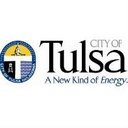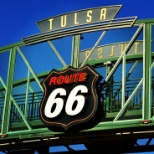City of Tulsa

City of Tulsa Headquarters Address
City Hall | One Technology Center
175 E. 2nd St
Tulsa, OK 74103
(view in map)
About City of Tulsa
History
Tulsa's first "town council" meeting in 1836, under an oak tree which still stands on a hill near the downtown area, was presided over by Archie Yahola, a full blooded Creek Indian and chief of the Tulsa Lochapokas. The name Tulsa was derived from "tallasi," a contraction of the Creek "Tullahassee" or "tallahassee," meaning "old town."
The town's initial growth came as a center for ranchers, farmers, and traders. When the post office was established in 1879, the name Tulsa became official. Cattle ranching became a major business in the area and led to the extension of the Frisco Railroad into the city in 1882.
Tulsa was incorporated as a municipality on January 8, 1898. With the discovery of oil in nearby Red Fork in 1901, the city grew quickly, reaching a population of 7,298 by the time of Oklahoma statehood in 1907. By 1920, the population had reached 72,075 and Tulsa soon earned the title, "Oil Capital of the World."
Although oil-related businesses remain an important part of the city's economy, Tulsa has developed a widely diversified business base which includes nationally prominent companies in aviation and aerospace, telecommunications, data processing, manufacturing, and distribution. The community's employment base is diverse and balanced among several job sectors including manufacturing, construction, services, high technology, health care, education, and transportation.
Today, Tulsa has grown to become a thriving community with a well-earned reputation as simply a great place to live. The original Council Oak tree spreads its branches overlooking a city park against a backdrop of high-rise buildings and expressways. It is a reminder that, while the city has branched out in many directions, its roots have remained strong.
Tulsa's first "town council" meeting in 1836, under an oak tree which still stands on a hill near the downtown area, was presided over by Archie Yahola, a full blooded Creek Indian and chief of the Tulsa Lochapokas. The name Tulsa was derived from "tallasi," a contraction of the Creek "Tullahassee" or "tallahassee," meaning "old town."
The town's initial growth came as a center for ranchers, farmers, and traders. When the post office was established in 1879, the name Tulsa became official. Cattle ranching became a major business in the area and led to the extension of the Frisco Railroad into the city in 1882.
Tulsa was incorporated as a municipality on January 8, 1898. With the discovery of oil in nearby Red Fork in 1901, the city grew quickly, reaching a population of 7,298 by the time of Oklahoma statehood in 1907. By 1920, the population had reached 72,075 and Tulsa soon earned the title, "Oil Capital of the World."
Although oil-related businesses remain an important part of the city's economy, Tulsa has developed a widely diversified business base which includes nationally prominent companies in aviation and aerospace, telecommunications, data processing, manufacturing, and distribution. The community's employment base is diverse and balanced among several job sectors including manufacturing, construction, services, high technology, health care, education, and transportation.
Today, Tulsa has grown to become a thriving community with a well-earned reputation as simply a great place to live. The original Council Oak tree spreads its branches overlooking a city park against a backdrop of high-rise buildings and expressways. It is a reminder that, while the city has branched out in many directions, its roots have remained strong.
Number of Employees in City of Tulsa
1,001 to 5,000
City of Tulsa Revenue
$100M to $500M (USD)
Industry




